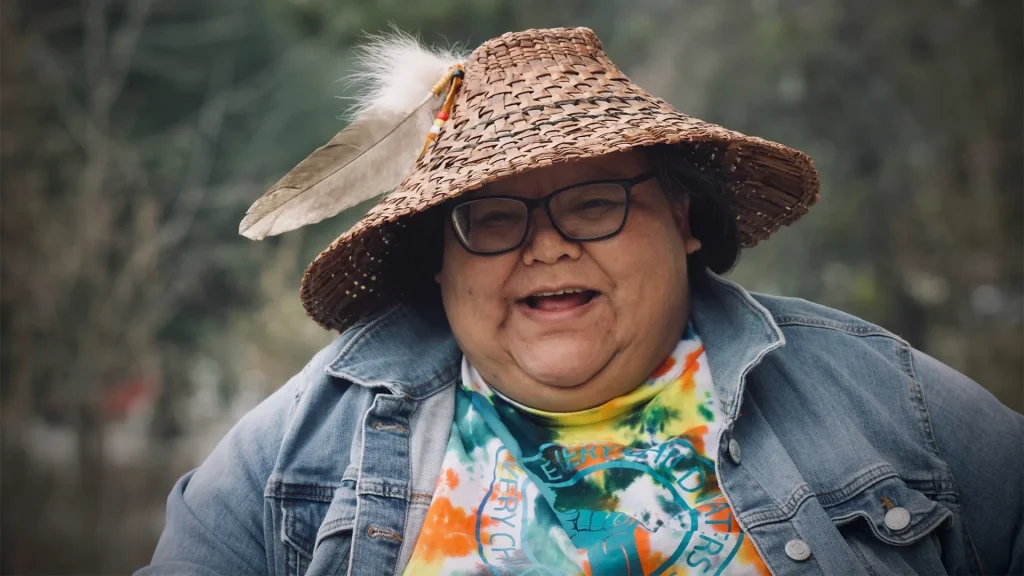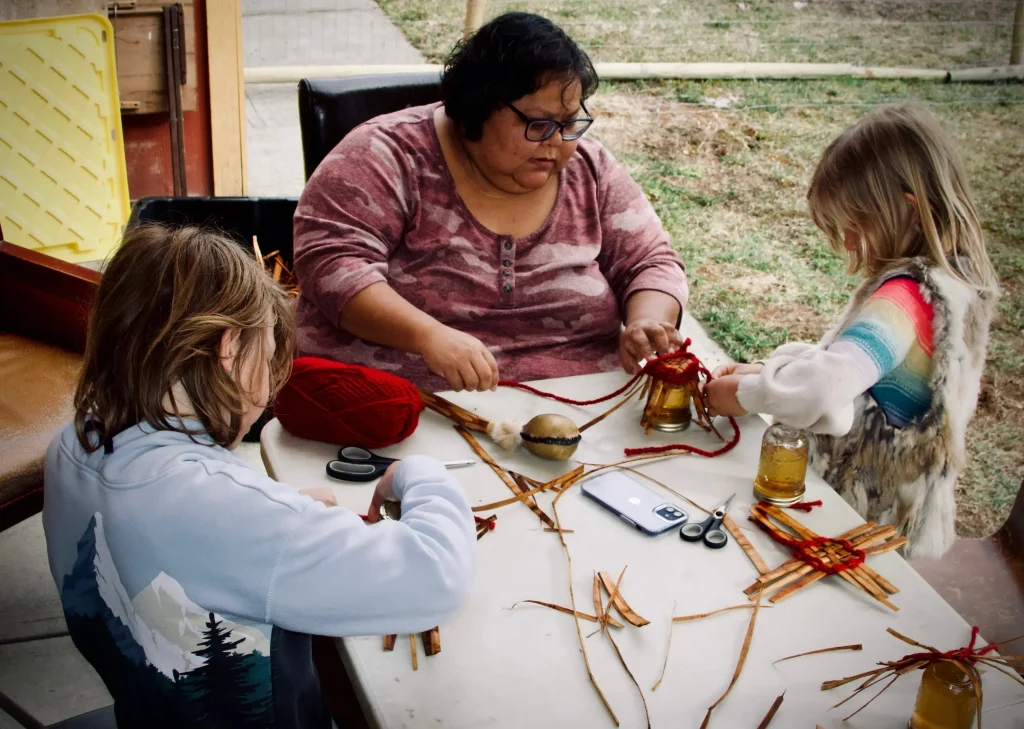amawílc Get Directions
amawílc means to come back to life to recover. This is where we are as a country. Truth and Reconciliation is deep felt work and the best way is to approach it with kindness and love.
amawílc means to come back to life to recover. This is where we are as a country. Truth and Reconciliation is deep felt work and the best way is to approach it with kindness and love.
Every one of us is an Indigenous person. We are all Indigenous to somewhere. Many of us have been away from that Indigenous part of ourselves for so long, but it’s still there inside us. If we can reconnect with it somehow, it will be so powerful. Tanina Williams
Tanina Williams is an Indigenous Knowledge Keeper, storyteller, and the founder of amawílc, an Indigenous consultancy business with a focus on Truth and Reconciliation and teaching Indigenous ways of knowing and being.
In her day-to-day role, Tanina hosts workshops for childrens’ groups, businesses, and educational institutions. She uses Indigenous techniques such as Circle Protocol to create an environment where people can feel safe, cared for, and heard while they learn.
Based in Mount Currie, BC, Tanina’s work is a necessary bridge between Indigenous teachings and the modern world. We recently caught up with Tanina to learn more about her important work.
amawilc means to come back to life. We’re at a place in our country where we’re at the infancy stage of Truth and Reconciliation, and what does that mean, to come back to life? To truly be the country we aspire to be.

What inspired you to start amawílc?
Originally, I wanted to do something with plants. My mom is a Knowledge Keeper that specializes in Indigenous medicinal plants. I love learning from her, and I love being with her in nature. Unfortunately, health issues meant I needed to take a different path.
I had been working with people in institutionalized settings and it was very defeating all the time. I was working within a system that doesn’t work. It doesn’t work for Indigenous people – it doesn’t work for anyone really.
I had been encouraged to pursue this type of work outside of an institutionalized setting and, over time, my approach towards it softened. I realized I could make a difference and that I could turn it into a successful business. It got real for me when I got my first contract. These people came to me, asking me for support, rather than working within a system I didn’t enjoy. They wanted positive change and I felt empowered working with them.
I was totally clueless, though. I didn’t know what my time was worth, and I think I charged them $30 an hour, which isn’t a lot of money. They were a small, not-for-profit company and they wanted to write a letter to the Lil’Wat Nation to engage with them about bike trails in the area. They wanted to ensure their plans were being respectful to local Indigenous peoples.
As a result of that letter, they took certain trails out of their plans because my people didn’t want those places disturbed. That simple letter, three hours of work for 90 bucks – it’s changed things positively in a small way in my area and it was so rewarding.
What kind of work do you do with amawílc?
amawilc is a consultant business based on teaching Indigenous ways of knowing and being alongside the Truth and Reconciliation agreements that we have in Canada. One of the most unique things about growing up in this country is that Indigenous people and non-Indigenous people are very diverse and learning how to communicate in a non-Indigenous environment has been a skill that I was able to learn.
amawilc means to come back to life. We’re at a place in our country where we’re at the infancy stage of Truth and Reconciliation, and what does that mean, to come back to life? To truly be the country we aspire to be. Truth and Reconciliation is a really difficult thing to talk about as an Indigenous person, because we’re not there yet. We’re just at the truth part and the world needs to know we have our own culture, our own language, and that those things are equal to anyone else.
I incorporate language into my workshops as much as I can, and then when I’m working with non-Indigenous children, I incorporate words in my storytelling. I’ve worked with School District 48 for 10 years now, giving kids the skills, but also the cultural knowledge that these teachings come from to help them become the person that they’re meant to be.
I grew up as an Indigenous person. That means that I understand when I’m learning something from an elder, or another Indigenous person, that I’m seeing and hearing them through this lens of knowing how we are.

What are Indigenous ways of knowing and being?
It’s how you live your life from an Indigenous perspective, living the way our people always have. There’s so much teaching around it because if you really wanted to know what it means it involves real work. I grew up as an Indigenous person. That means that I understand when I’m learning something from an elder, or another Indigenous person, that I’m seeing and hearing them through this lens of knowing how we are. I’m hearing what they’re saying and I’m interpreting it in that way. It’s a nice, comfortable way of learning.
How do you explain this to non-Indigenous people in your teaching?
There are several things I like to do, especially when I’m working with children. I find teaching children so much easier because their minds are completely open and they’re willing to decide independently if they agree with you or not – there’s nothing behind it. That’s the hardest part when you work with adults. They have this whole life of experiences behind them. If you can get them back into the mindset of being a child while they learn, abandoning those conscious and unconscious biases they hold – it makes all the difference.
I saw this cartoon once, there was one Indigenous man and a non-Indigenous man, and they were both on the edges of a cliff. The non-Indigenous man was saying something, and it came out as squares. The Indigenous man said something, and it came out in circles. They started to build this bridge towards each other and that was creating a common goal to be able to connect to each other. I believe this is one of my skill sets, to be able to do that cross-cultural communication.
These kinds of lessons are so difficult to teach. When I first started to decolonize myself, holy moly, I cried every day for a year. It was the hardest process to go through, but I don’t cry anymore. I know now that it’s just the old, colonized way of being coming out. I asked myself what it feels like to be Indigenous and not a colonizer and I started putting in the work. Over time, it became easier.
How can people get in touch and work with you?
It’s easy, you can visit my website, email me or call me. People communicate in so many ways, and I want to communicate with people in whatever way they’re comfortable with, and financially we can always work something out. I worked with a mother and children recently who traded me some honey and quartz rock for a lesson about cedar weaving. Her daughter wanted an antler pendant, so she got what she wanted, and I got a cool quartz rock.
amawílc means to come back to life to recover. This is where we are as a country. Truth and Reconciliation is deep felt work and the best way is to approach it with kindness and love.
No longer accepting clients Hide Business Address from Map View: Yes Hide Hours of Operation?: Yes Are your hours of operation currently affected by COVID-19?: No Offer Delivery: N/A Curbside Pickup: N/A Payment Type: Debit | Credit Wheelchair Accessible: N/A Valid From: Valid to:
Read the Full StoryLive out those #VanLife dreams and hit the open road with Honest Camper.
Read the Full Story Back to Top
Back to Top
We respectfully acknowledge our place of work is within the ancestral, traditional and unceded territories of the Xʷməθkʷəy̓əm (Musqueam), Sḵwx̱wú7mesh (Squamish) and səl̓ilwətaʔɬ/sel̓ílwitulh (Tsleil-Waututh) and that we serve the Peoples of the many Nations throughout British Columbia.